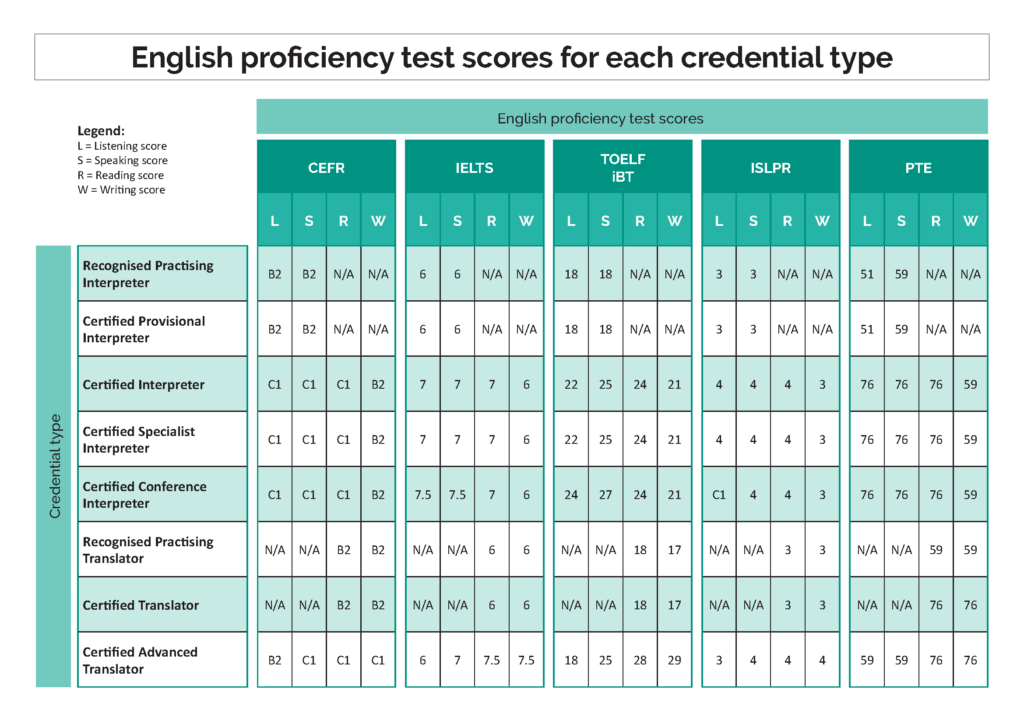Language competency is key to being able to successfully work as a translator or interpreter. NAATI uses English (and sometimes Auslan) language proficiency as a screening mechanism to ensure you already have the necessary language competency to cope in real-life practice.
We use the Common European Framework of Reference for Languages (CEFR) as the reference when determining the complexity of our tests. This is an international standard for describing language ability. You can read more about this below.
Each certification test has prerequisites you need to meet, including language proficiency. Read more about this under the ‘Pathways & prerequisites’ tab on each certification test page.
If your prerequisite pathway requires you to demonstrate your language proficiency, read below to learn what your options are.
If you have completed an Endorsed Qualification or Skill Set Course (which NAATI has advised meets the language proficiency requirement) within the last three years, you have already satisfied this requirement.
Evidence of English proficiency
If you need to provide evidence of your English proficiency to NAATI, you have several options available.
Completing a tertiary qualification in English
You don’t need to provide separate evidence of your English proficiency if you completed a tertiary qualification (degree level or higher) where:
- the course was taught in English, and
- English proficiency (comparable or greater than NAATI’s requirements) is an entry requirement for the qualification.
Please note that NAATI needs to be able to verify the English proficiency requirement for this qualification on the institution’s website.
Completing a formal English proficiency test
There are many English proficiency tests you can choose from.
- International English Language Testing System (IELTS) Test – General
- Occupational English Test (OET)
- Test of English as a Foreign Language – Internet-based test (TOEFL iBT)
- Pearson Test of English (PTE) – Academic
- Cambridge English Advanced (CAE) Test
- Cambridge Certificate of Proficiency in English (CPE)
- International Second Language Proficiency Ratings (ISLPR) English Test
The scores you would need, depending on the credential you are applying for, can be viewed below.

Native English speakers
NAATI considers a native English speaker to be someone who has been educated (in English) in a country where English is an official language.
If you are a native English speaker, you will need to provide evidence of either:
- Completing your primary and secondary education (equivalent to Australian secondary education year 12) at an institution/s where English was the primary language of instruction; or
- Completing your secondary (equivalent to Australian secondary education year 12) and tertiary education at an institution/s where English was the primary language of instruction.
Any evidence provided must show the number of years completed (i.e. 2013-2017).
Evidence of Auslan proficiency
Some pathways towards Deaf Interpreter credentials may require you to demonstrate your Auslan proficiency. Here are your options on how to do this.
Native Auslan signers
If you are a native Auslan signer, you will need to provide evidence of either:
- Completing your primary and secondary education (equivalent to Australian secondary education year 12) at an institution/s where Auslan, or Auslan and English were the primary language/s of instruction; or
- Completing your secondary (equivalent to Australian secondary education year 12) and tertiary education at an institution/s where Auslan and English were the primary languages of instruction.
Any evidence provided must show the number of years completed (i.e. 2013-2017).
Reference letter from a relevant state deaf society
NAATI will consider evidence in the form of a letter from a state deaf society confirming the applicant’s membership in the local Deaf community and fluency in Auslan.
- Deaf Connect (NSW, Queensland, SA, WA)
- Expression Australia (Victoria, Tasmania, WA)
What is CEFR?
The Common European Framework of Reference for Languages (CEFR) is a guideline used to describe achievements of learners of languages. The CEFR divides learners into three broad divisions and six levels; for each level, it describes what a learner is supposed to be able to do across the skills of reading, listening, speaking and writing.
Descriptors specify progressive mastery of each skill, which are graded on a six-level scale (A1, A2, B1, B2, C1, C2). NAATI has identified it as an important reference point for NAATI assessment of the comparability of scores across a range of English proficiency tests.
If you have any questions about whether your English proficiency test score is comparable please email info@naati.com.au and include a high-quality scan or electronic original of your test results.


